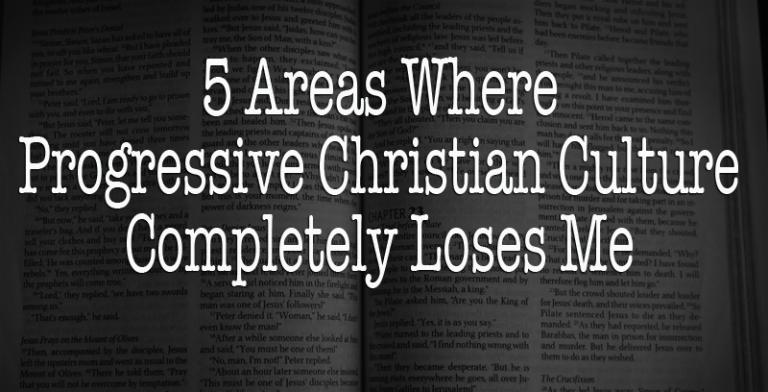I’m obviously known as a “Progressive Christian.” While I am not a fan of labels, I don’t mind having this one assigned to me because it’s a big tent and there’s room for me here. However, that doesn’t mean that I’m always on board with what other progressive thinkers are saying or affirming– there are many times where I find myself pushing back and saying, “you guys just lost me on that one.”
While Progressive Christianity is so broad that it is both impossible and unfair to make a blanket statement or sweeping critique, lately I’ve been thinking about 5 areas where I find myself internally distanced from some of what I see in Progressive Christianity. Since I’ve never held back from critiquing Evangelicalism, it seems only fair that I also be open about some elements of Progressive Christianity, both in thought and praxis, where I’m just not on board:
5. Policing the Progressive Christian borders
As I write in my forthcoming book, Christian Outsiders, once we begin to draw our identity from a Christian label instead of Christ himself, we quickly find ourselves in a destructive cycle of needing to police the borders of that label– correcting, chastising, and expelling those who cross outside of the lines the label has drawn. While fundamentalists and Evangelicals do this, progressives do it too– and I find it exhausting to deal with. Progressives do this mainly via the Progressive Twitter Police– folks who are probably well meaning, but have failed to realize they’ve just crossed over into a different kind of fundamentalism.
There are just far too many progressives ready to rebuke you for not being progressive enough. One time I recommended a book by an Evangelical author and was told that I “just lost the right to call myself a Progressive,” I was soundly scolded another time for suggesting that a central aspect of being a Christian is to “go out and make more disciples” (crazy idea, huh?), and thought folks would burn my house down when I suggested we shouldn’t be rooting for Mark Driscoll’s destruction.
Folks come to Progressive Christianity so they can question and wrestle in a safe place, which means that honest dialogue, even disagreement, is welcomed. Current culture however, has a toxic level of policing the progressive borders– and this is completely losing me.
4. Neglecting the truth that choosing to follow Jesus results in a changed life.
I get that words like “repent” can be trigger words reminding folks of their days in fundamentalism, but it must not be ignored that following Jesus means we live differently. Like it or not, following Jesus by definition means there are some things we’ll start doing and means there are some things we’ll stop doing (sin). Following Jesus is not some relative concept where everyone can just make up their own standards– Jesus is a real person with real teachings, and he tells his followers to obey those teachings (I get it, another trigger word).
While I feel it’s often ignored in parts of Progressive Christian culture, I don’t know how to ignore it myself: the invitation of Jesus is to repent from our sins and follow him into a new way of living. That’s always been the invitation– one that Christians in the New Testament even thought was an urgent invitation. As much as I love being a progressive, anything that leaves out the truth that we’re invited to follow Jesus and change our behavior as a result, will completely lose me.
3. Mishandling scripture to avoid traditional interpretations of it.
While scripture is not the 4th member of the Godhead as fundamentalists tend to make it, it is the Church’s “nonnegotiable partner” as Peter Enns calls it. The Holy Scriptures are foundational to Christianity, and are one of the key vehicles through which God speaks to his people.
While I arrive at many “progressive” theological stances, I am of the firm belief that whatever progressive stance we arrive at, we must arrive there through legitimate exegetical understandings of scripture. Far too often in progressive circles I find some problematic ways of dealing with scripture in order to arrive at a progressive position– something I think is unfortunate since I believe it’s possible to arrive there by way of exegesis and hermeneutical principles.
Often these situations play out with emotional arguments instead of arguments from the text, and even if the answer is correct, the process is what loses me. Trying to arrive at theological positions outside of solid exegesis also causes for there to be some pretty bizarre interpretations of passages (often by the same folks who police the boundaries, which is interesting.) Unfortunately, the Bible isn’t a choose your own adventure book where everyone can just make up their own meaning about passages and have it all be equally true. If one is going to put forward an alternate understanding of a passage– especially if such an understanding is in disagreement with historic interpretations– one must put forward legitimate exegetical and theological reasons why their understanding is the better one.
Whenever a theological case is made apart from solid exegesis, you’ve lost me.
2. Rejecting the concept of original sin or sin nature.
While I wouldn’t necessarily say this one is a widely held progressive position, I’ve seen it enough times that it’s become an issue on my radar. I recently followed a thread in a Progressive Christian Facebook group that covered this subject, and found myself unable to identify with the positions some folks were taking. One commenter went as far as saying, “we weren’t born with original sin, we were born with original blessing.”
There may be some legitimate theological discussions to be had around the theology of original sin, but I have a hard time taking seriously any argument that rejects the idea we have a natural tendency towards choosing sin. Or, maybe I’m just wrong on this issue and a really horrible person on top of it– because here’s what I know: I gravitate towards sinning. I always have. I always do. Reality is that I find myself in a daily battle to do what is right– a battle that is with a disposition deep inside me.
I don’t know a lot of things in life but I do know that I sin, and that this desire to pursue sin is something embedded deep within me. Any denial of this sin nature or original sin completely loses me, because it argues for a position that I experientially know does not jive with real life.
1. Removing any element of substitutionary atonement/the need to be saved.
I’ve been outspoken in my disagreement with the penal substitution metaphor for understanding the cross– this is not the historic/classic understanding of the atonement, and I think it sends us some dangerous messages about God. However, sometimes I see the opposite extreme happen in Progressive Christian circles to the point the atonement becomes relatively powerless, because it doesn’t seem to save us from anything.
While I see multiple ways of understanding Christ’s work on the cross expressed in scripture, the one thing I see clearly is that somehow, someway, Christ served as our substitute in order to ransom us (in fact, he claimed such).
Any theological label or category that does away with the core of the atonement is one that will have lost me, because out of all my years I know this one thing to be true: Benjamin L. Corey needs to be saved. He has a sin nature, he is without hope if left to himself, and he needs someone to save and redeem him from from the chronic mess he finds himself in. For me, the substitutionary element of the atonement is what gives me hope that I am being saved from this nature, and that I ultimately will be saved from it permanently at the resurrection.
I think there are plenty of battles to be fought over understanding the atonement, but to reduce it by removing the substitutionary element or the real, salvific result of that transaction, is something I simply can’t connect with. A reduced atonement doesn’t fix my problem: Benjamin L. Corey needs a savior.
…
I’m dedicated to following Jesus, and if that means I’ll be called a “Progressive Christian” I am quite content with that. However, my loyalty is to Jesus– and Jesus alone– which means I’m not willing to be constrained by any tribal boundaries and don’t have a problem pointing out areas of disconnect with some in my own tribe. In those cases, I’m content to say, “I love you guys, but you’ve lost me on that one.”
What about you? Are you content to be a progressive Christian who is also content in admitting that you’re still not a clean fit in all areas?
——————————–
* Disclaimers:
– These are personal disagreements with some people or areas of progressive thought. They do not represent all progressives since there’s no concise theological definition that all progressives agree on.
– I’m still quite happy to be considered a progressive… I just strongly disagree with some of the theology that comes out of this big tent.
















